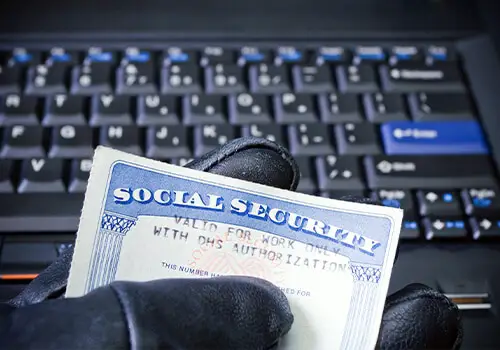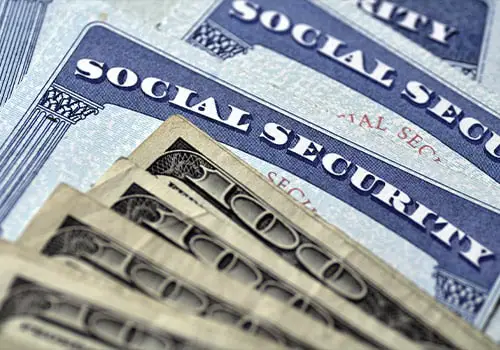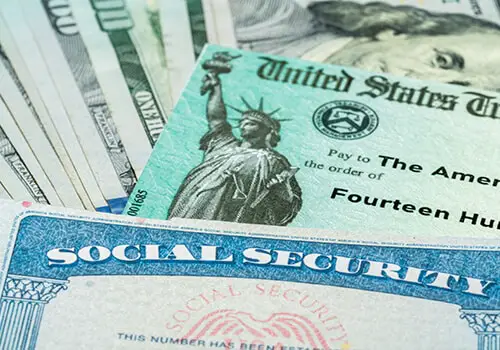Identity theft is becoming increasingly common, and a Social Security number is one of the most valuable pieces of information an identity thief can obtain. These thieves can use your SSN to commit fraud and wreak havoc on your financial information. A stolen SSN can lead to fraudulent new loans, credit cards, and other problems. A thief might even be able to access your bank account with your Social Security number and steal cash from your account!
So, how can you protect your social security number from being stolen? There are several ways to protect your SSN, so keep reading as we give you the 14 best ways to keep your SSN safe.
14 Best Ways To Protect Your Social Security Number
Nobody wants to have their Social Security number stolen, but many people are not taking the proper precautions to protect their SSNs from thieves. You can do many things to protect your number, and here are the 14 things that are most likely to keep your SSN safe.
#1. Don’t Carry Your Social Security Card With You
Most U.S. citizens are issued a Social Security card by the Social Security Administration (SSA) just a few weeks after birth. Since this card is such an essential piece of identification, many people carry the card in their wallet or purse, just like a driver’s license or credit card. However, this is a bad habit!
Carrying your card with you increases the odds of losing it or someone stealing it. Please do not carry your social security card with you unless you absolutely need it. For instance, you will likely need your card for employment verification when you start a new job. However, you should return the card to a safe place in your home for storage.
#2. Beware Of Phishing Scams
Phishing scams are on the rise, and many people unknowingly fall victim to them. Have you ever gotten an email that appeared to be from your financial institution asking you to verify your personal information? More than likely, that was a phishing scam! Your bank or other organizations seldom call or email you to ask to verify your information.
There are also many Social Security scams where callers pretend to be from the Social Security Administration. They might inform you that your Social Security number has been suspended or provide some other false information in an attempt to get your SSN. If you get a call, text, or email asking for your Social Security number, you should never provide it. Call the business back at a verified number to ask about the email. They can tell you whether they need any information from you.
#3. Never Share Your SSN Without Verifying The Recipient
You should always be cautious about sharing your SSN with anyone and verify their identity before handing over sensitive information. Consider this example. Suppose you are in the process of buying a car or a home. You get a call from someone claiming to be your bank and asking for your Social Security number.
Never give them this information without verifying their identity. The best way to do this is to call them back at a verified phone number or visit them in person if possible. The phone call might be from a scammer looking to steal your information.
#4. Review Privacy Policies
When you sign up for a new account or service, you likely never read all the fine print in the contract agreement. However, there is some important information there. Any business to which you provide personal information should have a privacy policy.
This policy governs how that business can store and use your personal information, including your Social Security number. If you find the privacy policy too relaxed, you might reconsider providing your SSN to that business.
#5. Memorize Your SSN
It is an excellent idea to memorize your SSN so that you can provide it from memory when needed. This reduces the number of times you might need to carry your Social Security card and the chances that your card could get lost in the shuffle. Memorizing your Social Security number can help prevent you from becoming the victim of identity theft due to a stolen or lost Social Security number.
#6. Regularly Check Your Account Statements
When you receive your bank, credit card, or other account statements, you should examine them closely for issues. If you notice suspicious purchases or activity, it could be a sign that someone has access to your personal information.
You should also ensure that other identifiers, like your account number, are safe. Regularly checking your statements can help you identify potential fraud much faster and prevent your SSN from being used fraudulently in the future.
#7. Register For A “My Social Security” Account
Head over to SSA.gov and sign up for a My Social Security account. An online account lets you view your Social Security statements, earnings history, benefit letters, and other important information. You can even request replacement Social Security cards, apply for benefits, or sign up for Medicare. Plus, signing up for your account prevents anyone else from using your SSN to register. If an identity thief uses your SSN to register for an account before you, it could allow them to steal your benefits.
#8. Monitor Your Credit Report
One of the first places you will notice ID theft is on your credit report. You are entitled to a free credit report from each major credit bureau (Equifax, Transunion, and Experian) once yearly. Head over to annualcreditreport.com to receive your report. Keep a check on your report and watch closely for any suspicious activity. You should take action immediately if you notice credit inquiries or new accounts that do not belong to you.
#9. Sign Up For Credit Monitoring
While monitoring your credit report is good, signing up for a credit monitoring service can be even better. This service can alert you in real time if someone attempts to use your SSN. For example, if a lender requests a copy of your credit file, you will know about it immediately. You might even be able to stop the fraud before the bank approves and funds the loan. Catching this type of activity sooner will help prevent fraud from worsening.
#10. Shred Sensitive Documents
Many documents contain your Social Security number, like your tax returns with the Internal Revenue Service (IRS). Your bank statements and other account statements will also include personal identifiers. While you might need to keep these documents for a certain period, you should always shred them when the retention period ends. Simply throwing these documents in the trash could lead to someone easily stealing your Social Security number.
#11. Block Electronic Access With The SSA
The Social Security Administration allows you to block electronic access to your account, and this Social Security lock can help in some cases. By blocking electronic access, no one can change the personal information associated with your Social Security number over the phone or online. Remember that this also includes you! So, you will be required to verify your identity at your local Social Security office to change your account.
#12. Create Secure Passwords
Creating secure passwords for your online accounts can help protect your social security number and identity. If you use simple or easy passwords, a hacker might be able to gain access to your online accounts. Once inside your account, they can see all your personal information associated with your account—including your social security number in some cases.
It would be best if you always used difficult and complex passwords to prevent others from gaining unauthorized access. Although memorizing or using those types of passwords might seem like a pain, they can save you a lot of headaches down the road.
#13. Don’t Send Your SSN Electronically
It would be best if you generally tried to avoid sending your SSN electronically whenever possible. Standard email can potentially be intercepted, and someone might be able to steal your Social Security number when you send it this way.
Similarly, using an online loan application could lead to problems if the website is not properly secured and encrypted. If you must provide your Social Security number over the Internet, ensure that the website you use is trusted and secure.
#14. Act Quickly If You Suspect Fraud
The final way to protect your Social Security number is to act quickly if you notice any issues. If you see strange items on your credit report or get an alert from your credit monitoring service, you must act swiftly. Failure to handle things quickly will likely lead to more fraud and significant problems. You must address issues immediately before they grow into even more significant problems.
KEY TAKEAWAYS
- A thief might be able to access your bank account with your Social Security number and steal cash from your account.
- You can do several things to protect your SSN, such as avoiding phishing scams, checking your account statements often, and monitoring your credit report.
- Scammers can use your personal information to open credit card accounts, file a fake tax return, and even file for Social Security benefits.
What Thieves Can Do With Your SSN
So, if someone obtains your Social Security number, what can they do with it? The answer is a lot. Some things they can do are obvious, while others are less well-known.
Obtain Loans and Open Accounts
First, a thief can obtain credit cards, apply for loans, and open new accounts with your SSN. They can use these credit cards or the loan proceeds for personal gain, and you might be stuck repaying the debt and left with a bad credit score.
Fake Tax Filings
In addition, they can also file fraudulent tax returns with the IRS. This could get you in trouble with the IRS and could undoubtedly delay any potential tax refund you might be waiting for. Many taxpayers have no idea this has happened until they file their real tax return and it gets rejected by the IRS. Then, they are left with a big mess to clean up.
File for Social Security Benefits
Finally, a thief might use your SSN to apply for Social Security benefits. Imagine getting ready to retire only to find that someone has already started receiving your retirement benefits. Now that you can see how a thief could use your SSN, you should understand the importance of keeping it safe and secure to reduce your identity theft risk.
Must read articles related to Social Security Numbers
- Find your Social Security Number Prefix by state.
- Can your Social Security number be suspended?
- What is a Social Security Award Letter…how do you get a copy?
- How do you verify if someone is using your Social Security number?
- Why is your Social Security number important?
What To Do If You Are The Victim Of Identity Theft
Many people wonder what they should do if they become a victim of ID theft. There are a few steps that you should take right away.
Notify The Police
First, you should file a police report about your stolen identity. You might be able to file the report with your local police department, or you might be required to file the report where the theft occurred. Most police agencies are familiar with taking these types of reports today because they happen so frequently.
File A Report With The FTC
Next, you should report the ID theft to the Federal Trade Commission (FTC). The FTC is the government agency that handles all identity theft reports. Most credit bureaus require an FTC report identification number before they will work with you to remove fraudulent items from your credit report.
Place A Fraud Alert On Your SSN
The next step is to place a fraud alert on your SSN with the credit bureaus. This fraud alert will notify the bureaus that your SSN has been compromised, and lenders should take additional steps to verify your identity before they issue new credit in your name.
You can even place a freeze on your SSN that prevents anyone from obtaining a copy of your credit report. Are you wondering how to freeze your Social Security number? You need to contact one of the credit bureaus to place a freeze on your SSN. Notifying your banks and other financial institutions that your SSN has been compromised is also a good idea. This could prevent someone from gaining unauthorized access to your accounts.
Monitor Your Credit Report
Keep a close eye on your credit report and consider signing up for a credit monitoring service. If you notice anything suspicious, you should take action immediately. For those who already have a fraudulent item on their credit report, you will need to work with the credit bureau to have the fraudulent items removed. You can also visit identitytheft.gov for additional tips and information on creating a recovery plan.
Last Resort – Request A New Social Security Number
In rare cases, the Social Security Administration will issue a new Social Security number. If you have experienced ID theft that is so devastating that you can never recover from it, the SSA might issue a new Social Security number that allows you to start fresh. This only happens in severe cases, so you should not take this step if you have only experienced mild or routine ID theft.
TIP
Victims of identity theft should notify the police and file a report with the FTC. Notifying authorities of the crime can help them catch the perpetrators and prevent others from being scammed.
The Bottom Line
Protecting your Social Security number is one of the best ways to avoid ID theft. There are many things you should do to protect your SSN. Some of those include not carrying your Social Security card, not sharing your SSN electronically, shredding sensitive documents, and monitoring your credit report.
If you suspect your SSN has been compromised, you should act immediately. Failure to take swift action could lead to more significant problems, and it might take longer to correct them.
Frequently Asked Questions
The best way to check if someone is using your Social Security number is to check your credit report. If you notice inquiries or accounts that do not belong to you, someone has likely been using your SSN without your knowledge.
You should also check your Social Security statement for accuracy to ensure no one has attempted to apply for Social Security benefits using your information.
When you lock your Social Security number with the credit bureaus, lenders cannot obtain a copy of your credit report. This will generally prevent anyone from obtaining new credit in your name.
However, if you need to apply for a loan, you must unlock your SSN before starting the loan process. Locking your SSN prevents all access to your credit file—even access that you initiate. Are you wondering how to lock your Social Security number? Just contact one of the three credit bureaus to start the process.
There are a couple of things you should do to protect yourself after your SSN is stolen. First, you should place a fraud alert on your Social Security number.
Next, check your credit report and sign up for a credit monitoring service. This service will notify you immediately if anyone attempts to use your SSN to obtain credit.
Finally, an identity protection service can even help you remove fraudulent items from your credit report and provide insurance protection from financial losses caused by fraud.
If someone has your Social Security number, you should generally take the same steps as if your number has already been used. You should place a fraud alert on your SSN and sign up for a credit monitoring service.
Follow these steps immediately. Waiting too long might allow the person to use your SSN fraudulently, leaving you with more significant problems.
You can find a Social Security Administration office near you by using our SSA office locator and searching for your closest location.







